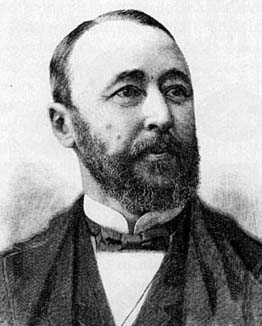


 تاريخ الرياضيات
تاريخ الرياضيات
 الرياضيات في الحضارات المختلفة
الرياضيات في الحضارات المختلفة 
 الرياضيات المتقطعة
الرياضيات المتقطعة
 الجبر
الجبر
 الهندسة
الهندسة 
 المعادلات التفاضلية و التكاملية
المعادلات التفاضلية و التكاملية 
 التحليل
التحليل
 علماء الرياضيات
علماء الرياضيات |
Read More
Date: 18-12-2016
Date: 8-12-2016
Date: 12-12-2016
|
Died: 7 September 1918 in Christiania (now Oslo), Norway

Ludwig Sylow studied at Christiania University and won a mathematics contest in 1853. He then took the high school teacher examination in 1856 and, as no university post was available, taught in the town of Frederikshald from 1858 to 1898.
Sylow continued his mathematical studies however (see [2])
at first working on elliptic functions in the tradition of Abel and Jacobi, inspired by the professor of pure mathematics Ole Jacob Broch. Finding Abel's papers on the solvability of algebraic equations by radicals more interesting, Sylow was led from them (by the professor in applied mathematics, Carl Bjerknes) to Galois.
In 1861 Sylow obtained a scholarship to travel and visited Berlin and Paris. In Paris he attended lectures by Chasles on the theory of conics, by Liouville on rational mechanics and by Duhamel on the theory of limits. He says, in the report he wrote at the end of the scholarship, that he also:-
made myself acquainted with newer works, particularly in the theory of equations.
In Berlin he had useful discussions with Kronecker but was unable to attend courses by Weierstrass who was ill at the time.
In 1862 Sylow lectured at the University of Christiania, substituting for Broch. In his lectures Sylow explained Abel's and Galois's work on algebraic equations. A summary of these lectures is presented in [2]. It is worth noting that although he had not proved 'Sylow's theorems' at this time (he published them 10 years later) he did pose a question about them. After proving Cauchy's theorem that a group of order divisible by a prime p has a subgroup of order p, Sylow asks whether it can be generalised to powers of p.
Between 1873 and 1881 Sylow and Lie prepared an edition of Abel's complete work. Lie said that most of the work was done by Sylow. However Sylow's fame rests on one 10 page paper published in 1872.
In this paper Théorèmes sur les groupes de substitutions which Sylow published in Mathematische Annalen Volume 5 (pages 584 to 594) appear the three Sylow theorems. Cauchy had already proved that a group whose order is divisible by a prime p has an element of order p. Sylow proved what is perhaps the most profound result in the theory of finite groups.
If pn is the largest power of the prime p to divide the order of a group G then
Almost all work on finite groups uses Sylow's theorems.
Sylow became an editor of Acta Mathematica and, in 1894, he was awarded an honorary doctorate from the university of Copenhagen.
Lie had a special chair created for Sylow at Christiania University and Sylow taught at the university from 1898.
Articles:



|
|
|
|
تفوقت في الاختبار على الجميع.. فاكهة "خارقة" في عالم التغذية
|
|
|
|
|
|
|
أمين عام أوبك: النفط الخام والغاز الطبيعي "هبة من الله"
|
|
|
|
|
|
|
قسم شؤون المعارف ينظم دورة عن آليات عمل الفهارس الفنية للموسوعات والكتب لملاكاته
|
|
|